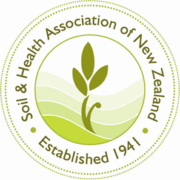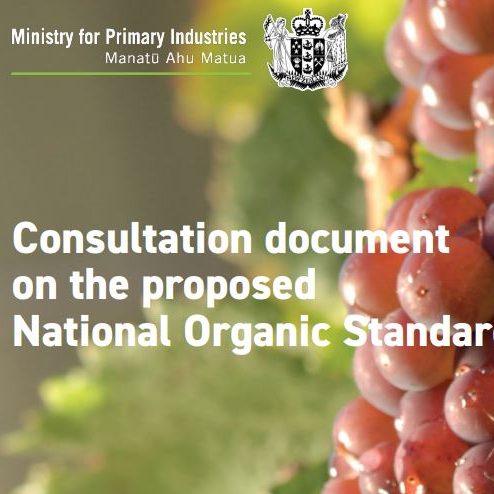29 August 2019
Environmental Protection Authority
Private Bag 63002
Wellington 6140
New Zealand
Submission on application APP203660
To reassess methyl bromide
Introduction
1. The Soil & Health Association of New Zealand Inc. (“Soil & Health”) is a charitable society registered under the Incorporated Societies Act 1908. It is the largest membership organisation supporting organic food and farming in New Zealand and is one of the oldest organic organisations in the world, established in 1941. Soil & Health’s objectives are to promote sustainable organic agricultural practices and the principles of good health based on sound nutrition and the maxim: “Healthy soil, healthy food, healthy people”. Its membership comprises home gardeners and consumers, organic farmers and growers, secondary producers, retailers and restaurateurs. Soil & Health publishes the bi-monthly ‘Organic NZ’ magazine – New Zealand’s leading organics magazine.
2. Soil & Health makes this submission on the application by Stakeholders in Methyl Bromide Reduction Inc (STIMBR) to reassess methyl bromide a fumigant that is among other things is used on export timber and logs.
3. Soil & Health accepts the need for fumigation to meet the phytosanitary needs of New Zealand and other countries, should safer methods of pest control not be effective, and if communities and the broader environment are protected from any adverse effects from the fumigant.
4. The EPA in 2018 allowed the possibility of a reassessment application;
‘Grounds to reassess were granted based on data that evidenced New Zealand’s use of the fumigant has increased from over 400 tonnes a year in 2010, to more than 600 tonnes in 2016. One of the criteria required to meet grounds for reassessment under the Hazardous Substances and New Organisms Act, is a significant change in the quantity of a substance imported into or manufactured in New Zealand.’
5. Soil & Health believes that the reassessment criteria were used inappropriately, as that increased use was predicted at the last reassessment with conditions of use and the recapture deadline made in that knowledge. It is misleading to use increased use to allow another reassessment to effectively excuse the log export industry out of their environmental and public health responsibilities when those responsibilities were clearly defined in 2010.
6. Soil & Health submitted to the Environmental Risk Management Authority (ERMA) for the reassessment of methyl bromide in 2010 and has campaigned since to have that fumigant better contained and recaptured or stopped.
7. Those campaigns along with other community, union, and environmental groups have meant that methyl bromide fumigation without recapture is no longer used at log exporting facilities in several ports, notably Nelson, Picton and Wellington. However the problems of worker exposure and release of the atmospheric ozone depleting gas have mostly just shifted north to the ports of Napier, Tauranga, and Marsden Point-Whangarei.
8. This submission writer, later in another role as a Section 274 Party, won an Environment Court case, Envirofume Limited vs Bay of Plenty Regional Council [2017] NZEnv 12. That case, contested for the applicant Envirofume by legal counsel Helen Atkins (Chairperson of the 2010 ERMA methyl bromide re-assessment), exposed further the significant risks of methyl bromide fumigation for the health and safety of workers and nearby communities.
9. The log exporter industry through STIMBR have variously used public funding as in the Primary Growth Partnership (PGP) funding to look mostly at predictably unlikely alternatives to recapturing residual methyl bromide, while obfuscating attempts at log stack trials of existing recapture technology using carbon filters as available from Nordiko.
10. STIMBR supported Draslovka who applied for an alternative fumigant ethanedinitrile (EDN) which the Ministry for Primary Industries (MPI) appear to be taking seriously in negotiations with log importing countries as an alternative to methyl bromide, on the premise that recapture will not be necessary should EDN be approved, as it is not subject to the Montreal Protocol.
11. Soil & Health submitted in opposition to EDN due to the known risks, and the lack of environmental and safety data, and that the applicant and STIMBR’s approach that recapture would not be required, although in Australia, EDN can ONLY be used with scrubbing (a recapture) technology as part of its label use after being assessed by the national regulatory body there, the Australian Pesticides and Veterinary Medicines Authority (APVMA).
12. Soil & Health is concerned that government agencies such as MPI might be looking at the EPA as a rubber-stamping agency for compounds such as EDN with such confidence that they are putting EDN as an option for fumigation to countries including India and China. Soil & Health is concerned that industry’s economic benefits appear to become paramount over the need of worker, community and environmental health in the decision making around fumigants approval and their use.
13. However, the EPA has decided to process this application by STIMBR as a modified reassessment rather than forcing the previous reassessment’s requirement of recapture onto the users of methyl bromide fumigation.
The Tauranga example
14. While economic considerations are included in the benefits analysis by the EPA, the ability to pay for appropriate safeguards must be included in any analysis, not just the significant earnings the industry generates. All stakeholders including port companies should be part of ensuring the ultimate safety of workers, community and environment.
15. In the Environment Court case, Envirofume Limited vs Bay of Plenty Regional Council [2017] NZEnv 12, it was noted that Port of Tauranga Limited (POTL) did not attend those proceedings although it was the owner and operator of the port where the log fumigation activity under scrutiny was taking place.
16. The community and Soil & Health have long called for dedicated fumigation facilities incorporating recapture technology to be constructed and used, yet POTL continue to discount any such possibility there.
17. Soil & Health points out that POTL has just announced its largest profit ever (end of year June 2019). Increasing 6.7% on last year’s profit of $94.3 million to reach $100.6 million, with log export volumes increasing during that time 12.5% to 7.1 million tonnes. http://www.port-tauranga.co.nz/growth-in-cargo-volumes-contributes-to-increased-profit-for-port-of-tauranga-limited/
While that growth is expected to ease in the short term, POTL is still the country’s largest export log exporter, close to twice its nearest rival Whangarei.
18. Log exports through POTL for the year ending December 2017 were valued at $968,919,331, almost a staggering billion dollars towards a third of New Zealand’s log export value that year of $3,058,737,889 and yet the port company and log exporting interests continue to deny workers, the community and environment the benefits of recapture.
19. Safeguards to protect people and the environment are becoming more important and need greater attention as increasing development and presence of toxins including fumigants in the environment become more common.
20. Soil & Health submits that the money is there for fast correction of the shortcomings in facilities and responsible management of log and timber fumigation in New Zealand.
Monitoring and modelling
20. Methyl bromide is a risk well beyond fumigation areas due to drift, inversion layers, and the inability by those responsible to adequately monitor its whereabouts. Boundary monitoring is pointless if at head height, when a fumigant plume passes above it and then descends or drifts into other areas.
22. Air modelling techniques cannot fully give assurances about where and at what concentrations methyl bromide will be once released from containers, log stacks or ships holds. Modelling can at best be a best estimate, but the topography of the fumigation surrounds is continually changing with log or container stacks, ships size and presence, and weather variables, including humidity, temperature of air, objects and ground all obfuscating the best air modelling estimates.
23. There is no sure air monitoring possibility, or method for the safe release of methyl bromide in the port and coastal marine area. A previous Environment Court in Nelson noted the possibility for “monitoring devices to miss the most concentrated area of the plume, or even the plume in its entirety, and in fact on four out of seven attempts to sample air quality in Port Nelson during 2003-2004 this had occurred in varying degrees” (Env Court Interim Decision para 50).
24. Soil & Health notes STIMBR’s intent that recapture of fumigant from ships holds be delayed significantly, another 10 years, yet ships’ holds are where the most significant volumes of methyl bromide are used. The communities near the ports of Napier, Tauranga and Mt Maunganui, and Marsden Point (Whangarei port), and potentially elsewhere in New Zealand will be further exposed to the toxicity of methyl bromide, and the damage to the ozone layer will continue.
25. Other port workers, not involved in fumigation but working nearby, may also be exposed to the methyl bromide, particularly when the methyl bromide is released into the atmosphere following fumigation, but also during accidental and spontaneous release, as happens with methyl bromide most years, at most log stack fumigating ports. Log stack fumigations under tarpaulins are subject to strong wind events and accidental tarpaulin puncturing. Both Genera and Envirofume fumigation operators have had log stack tarpaulins rent with spontaneous release of methyl bromide. Dedicated permanent fumigation structures would eliminate the risk of tarpaulin failure.
Worker and community safety
- In the Environment Court decision Envirofume Limited vs Bay of Plenty Regional Council, [2017] NZEnv 12, the court observed the large range of port users that may be exposed inadvertently to the methyl bromide fumigant. [1]
- That Court found significant shortcomings in the current methyl bromide fumigation. EPA and Work Safe requirements are either impractical or are frequently breached.
- Whatever toxic fumigant is used for log, timber and other fumigation, it must be in a dedicated facility with recapture of remnant fumigant, such as is used at Port Nelson. Methyl bromide was linked at that port with the deaths of six men from motor neurone disease. Alternative fumigants such as EDN have their own array of serious health risks. Recapture technology exists but industry individually and collectively has mostly avoided its use for economic reasons.
Ozone depletion
- Continued methyl bromide release means further atmospheric ozone depletion, and New Zealand’s intentional breach of responsibility to its Montreal Protocol obligations, where although phytosanitary requirements allow some continued use of methyl bromide, there is an obligation to be reducing its use. ERMA allowed a continuance of damaging release into the atmosphere in 2010 with the knowledge that there would be a significant increase in methyl bromide use.
- Dr Olaf Morgenstern – Programme leader (Climate Variability and Change) NIWA for the writer at the Environment Court outlined the significance of that release in world terms, with New Zealand being the highest user per capita. That should not continue if we are concerned about climate effects and the health of people and environment, or economically if our international, including trading, clean green branding reputation is to be valued.
Health effects.
- Most people acknowledge the very real danger of methyl bromide from both acute and chronic exposures, and both acute and chronic effects. A recent although limited US study recently published in the Journal of Asthma reported a positive association between methyl-bromide concentrations and asthma-related emergency department (ED) visits among youths between the ages of 6 and 18 years in California.
- After adjusting for the presence of other pollutants, humidity, and meteorological conditions, each 0.01-ppb increase in methyl-bromide concentration was associated with a 7.1% (95% CI, 2.9%-10.8%) greater likelihood of an asthma-related ED visit.
- That science will need more work but further shows the need for recapture if real precaution is to be used.
The solution – dedicated containment and recapture.
- Responsibility for dedicated containment and recapture facilities was considered by the Environment Court to require an integrated approach:
[130] Overall, our view is that this matter requires an integrated approach from the Port of Tauranga, the marshalling/stevedoring companies, the forestry industry and the fumigators to adopt an approach for the safe application of methyl bromide and the recapture of all reasonable emissions. This would probably require a dedicated area for fumigation, and may involve a building or other system that seeks to encapsulate and recapture gas. We are not satisfied that the introduction of another company into the Tauranga market is going to bring about those changes. In our view, the advance towards reduction of emissions has seen little progress since the 1990s, and the Court is surprised to see that there is approximately ten times as much methyl bromide being applied in Tauranga as there was in the 1990s.
- Regardless of the possibility of an alternative fumigant, industry including port companies and possibly government need to bite the bullet and install dedicated facilities for fumigation and recapture.
- The ERMA 2010 methyl bromide re-assessment inappropriately and possibly illegally set a very late 2020 date for recapture of that fumigant to meet Montreal Protocol requirements of phasing out methyl bromide emissions. The EPA must now insist on dedicated fumigation facilities and recapture always, if the EPA is to meet its statutory requirements.
- Soil & Health supports the substantive submission of the Combined Trade Unions, and is in general agreement of the fumigation context and need for stronger and certain safety conditions as supplied by the Bay of Plenty Regional Council.
- Soil & Health submits that the evidence as attached and provided by expert witnesses for the writer for the Envirofume Environment Court case be considered by the EPA. That included evidence by an epidemiologist Dr Dave McLean from the Centre for Public Health Research, Dr Olaf Morgenstern – Programme leader (Climate Variability and Change) NIWA, and Jayne Metcalfe an air scientist.
Conclusion.
39. Soil & Health seek that the current application be declined.
40. Should the application be granted, dedicated fumigation facilities and recapture must be required.
41. Soil & Health wish to be heard in support of our submission and welcome any questions of the writer for clarification or further information.
Yours sincerely
Steffan Browning
021 804 223
greeny25@xtra.co.nz
Position: National Councillor
The Soil & Health Association
PO Box 9693,
Marion Square,
Wellington, 6141
Email: advocacy@organicnz.org.nz
Website: www.organicnz.org.nz
[1] https://www.environmentcourt.govt.nz/assets/Documents/Decisions/2017-NZEnvC-012-Envirofume-v-Bay-of-Plenty-Regional-Council.pdf








